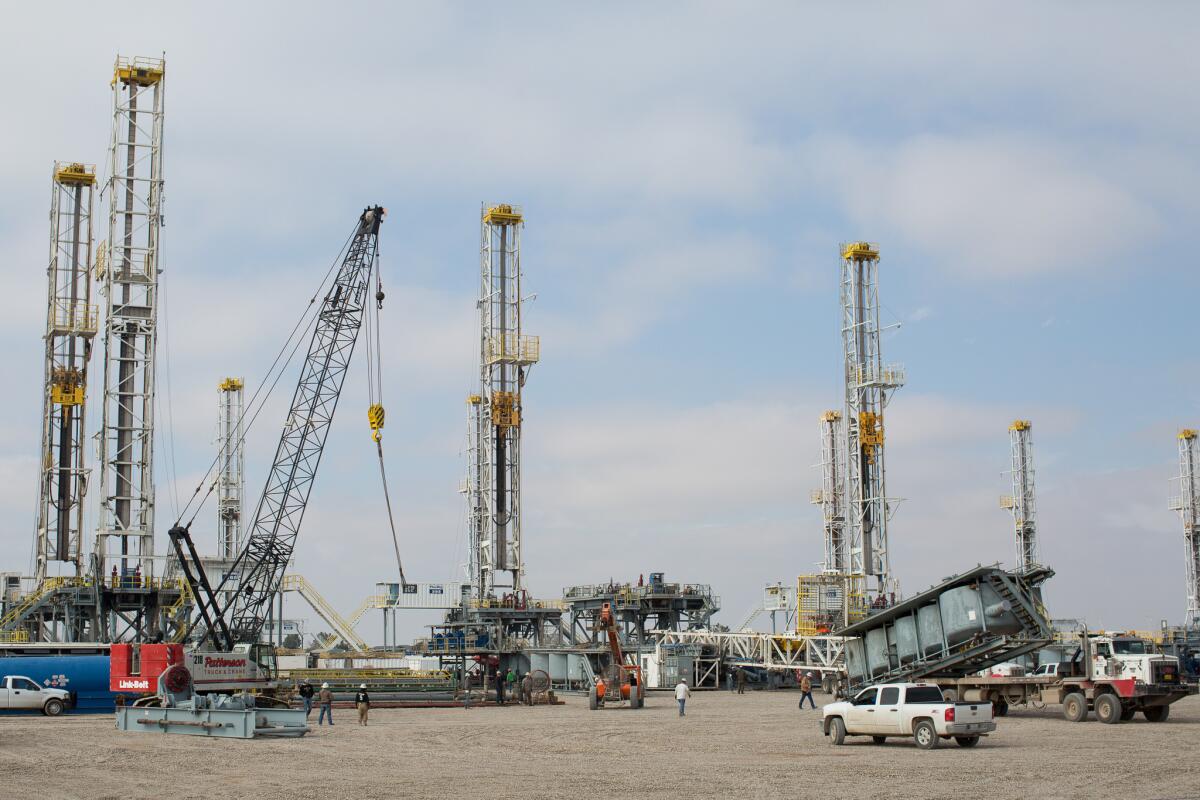Obama administration’s new fracking rules criticized by both sides

- Share via
Reporting from New York — As the Obama administration took the first step Friday to regulate the drilling method known as fracking, opposition to the safety measures underscored the challenge of policing a practice that has cut U.S. dependence on foreign oil but raised fears of environmental damage and water contamination.
Criticism of the regulations was swift and came from energy companies and lawmakers representing fracking states, including California, who said the rules would undercut the domestic energy market. But Interior Secretary Sally Jewell, a former petroleum engineer who has experience with the practice formally known as hydraulic fracturing, said safety standards had not evolved since she fracked wells more than 20 years ago in Oklahoma.
“Many of the regulations on the books today haven’t kept pace with advances in technology,” said Jewell, who announced the new rules during a conference call with reporters. She said they were aimed at preventing leakage of the fluids used in fracking, and at requiring companies to make public the chemicals used in their operations.
“There is a lot of fear,” Jewell said. “There’s a lot of public concern particularly about the safety of groundwater.”
Among other things, the rules require energy companies to publicly disclose the chemicals used in fracking, which involves blasting chemically laden fluid into rock to reach gas and oil. Companies must verify their wells’ integrity and have “strong cement barriers” between well bores and water zones through which the bores pass. They will be required to use covered or netted tanks to store above-ground fluids used in fracking, and they will have to give officials detailed drilling information to prevent cross-well contamination.
They rules take effect in 90 days and apply only to wells that have not yet begun fracking. They do not apply to the tens of thousands of wells on public land that already are fracking. Janice Schneider, assistant Interior secretary for land and minerals management, says there are about 100,000 oil and gas wells on federal land and about 90% are being fracked.
The rules also do not affect wells on private or state land, which make up the vast majority of fracking wells. Neil Kornze, director of the Bureau of Land Management, said the bureau controls about 32 million acres of land, an area less than the size of Florida. He said the bureau received about 5,000 new drilling permits each year.
Officials said that they hoped the new regulations would serve as a model for the country and that states and private landowners would adopt them.
Fracking is underway in 19 states, but within some of those states there are local moratoriums because of public worries over potential impact on water and wildlife, and over seismic activity resulting from horizontal cracking of geological formations to reach previously inaccessible oil and gas reserves.
Industry officials say the practice is safe, and within minutes of Jewell announcing the new regulations, the Independent Petroleum Assn. of America and Western Energy Alliance filed a lawsuit to try to block the rules. The complaint, filed in federal court in Wyoming, said the Bureau of Land Management lacked evidence to support the new regulations.
Some lawmakers said states should be allowed to regulate their own practices.
“If it’s Friday, the Obama administration is sure to release yet another regulation,” said House Majority Leader Kevin McCarthy (R-Bakersfield). McCarthy said fracking had “elevated America as a global energy superpower again.”
“And because of our rise, we have more jobs and lower gasoline prices,” he added.
Similar criticism came from two notable Republicans, Sen. Lisa Murkowski of Alaska and former Texas Gov. Rick Perry.
Some Democrats and environmentalists, though, said the federal government did not go far enough. “We will continue to work to completely ban fracking on public lands,” said Rep. Jan. Schakowsky of Illinois. Schakowsky and fellow Democratic Rep. Mark Pocan of Wisconsin said they planned to introduce legislation this year to outlaw the practice.
Of the states where fracking is underway, officials say 13 have guidelines in place. Some already adhere to the new regulations. Steven Bohlen, California’s oil and gas supervisor, said he was confident the state’s existing regulations would meet the new federal standards.
“We welcome the federal government governing its own lands, but it will have no impact on the state regulations because the state regulations are equal to or more stringent to all federal regulations that I know about,” Bohlen said.
California’s oil industry is the fourth-largest in the nation. Its path to formulate fracking regulations began in 2013 with the passage of state Senate Bill 4, which established what were considered the nation’s strictest rules.
However, the new federal rules would ban in most cases the use of open, unlined pits to dispose of fracking fluids and oil field waste. Such pits are common in the southern San Joaquin Valley, where local officials recently discovered hundreds of unpermitted pits.
Jewell said she expected opposition to the rules, which took four years to compile and involved more than 1.5 million comments from individuals and groups. But she called the new standards “essential” to protecting public land and reassuring the public.
tina.susman@latimes.com
Twitter: @TinaSusman
Times staff writer Julie Cart in Los Angeles contributed to this report.
More to Read
Sign up for Essential California
The most important California stories and recommendations in your inbox every morning.
You may occasionally receive promotional content from the Los Angeles Times.













